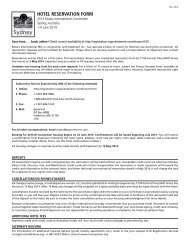로타리안을 위한 프로그램 안내서: 연구단 교환 (GSE) - Rotary ...
로타리안을 위한 프로그램 안내서: 연구단 교환 (GSE) - Rotary ...
로타리안을 위한 프로그램 안내서: 연구단 교환 (GSE) - Rotary ...
Create successful ePaper yourself
Turn your PDF publications into a flip-book with our unique Google optimized e-Paper software.
SECTION 1<br />
<strong>GSE</strong> Participation<br />
Designing your <strong>GSE</strong><br />
APPOINTING A <strong>GSE</strong><br />
SUBCOMMITTEE<br />
The district governor (DG) appoints a <strong>GSE</strong><br />
subcommittee composed of at least three members<br />
whose terms are staggered. The district<br />
governor-elect (DGE) must be a member of<br />
the subcommittee and, with the DG, should<br />
select its members. The <strong>GSE</strong> subcommittee is<br />
different from the <strong>GSE</strong> selection committee,<br />
which is responsible for selecting the district’s<br />
<strong>GSE</strong> team. The DG and DGE participate on<br />
both the subcommittee and committee.<br />
The District <strong>GSE</strong> Subcommittee’s<br />
Responsibilities Are:<br />
• Ensure there is enough club and district<br />
support for the outbound and inbound<br />
teams<br />
<strong>GSE</strong>s with a high degree of focus, planning, and orientation are the most<br />
successful. Consider the district’s overall international service goals<br />
and determine how your <strong>GSE</strong> may contribute to them.<br />
In what other Foundation programs does your district participate?<br />
If your district has completed a Matching Grant project with another<br />
district, a <strong>GSE</strong> is an excellent follow-up to the project.<br />
What are the predominant industries in your district?<br />
Perhaps you can seek partner districts with similar industries.<br />
What key issues is your district addressing through <strong>Rotary</strong> service:<br />
maternal and child health, water and sanitation, disease prevention<br />
and treatment, basic education and literacy, economic and community<br />
development, or peace and conflict prevention/resolution?<br />
A <strong>GSE</strong> team composed of specialists from these fields would be a<br />
unique extension of a club or district project.<br />
What areas of the world has your district visited in the past five years?<br />
Vary your pairing history. For example, if your district hasn’t recently<br />
sent a <strong>GSE</strong> team to Southeast Asia or a low-income country, perhaps<br />
you should work to find a partner from that area of the world.<br />
• Distribute <strong>GSE</strong> materials and resources<br />
• Publicize the program<br />
• Prepare teams before departure by<br />
organizing an orientation program<br />
• Prepare host itinerary and logistics<br />
• Ensure program policy adherence<br />
• Determine important district <strong>GSE</strong><br />
deadlines<br />
• Act as liaison between club committees<br />
and the <strong>GSE</strong> staff at TRF<br />
• Organize post-exchange follow-up and<br />
ensure submission of final reports to TRF<br />
The district <strong>GSE</strong> subcommittee does not<br />
select team members. See “Building a<br />
Selection Committee” (page 15).<br />
Variations in the Traditional <strong>GSE</strong><br />
No Trustee approval is required for the following<br />
types of exchanges, with the understanding<br />
that all candidates must meet the<br />
<strong>GSE</strong> team member eligibility criteria:<br />
Area of Focus <strong>GSE</strong>s<br />
Teams are composed of participants with vocations<br />
related to one or more of TRF’s areas<br />
of focus (maternal and child health, water<br />
and sanitation, disease prevention and treatment,<br />
basic education and literacy, economic<br />
and community development, and peace<br />
and conflict prevention/resolution). Districts<br />
should research the strengths and needs of<br />
their community. If a strength is found that<br />
relates to a focus area, districts can recruit<br />
professionals from the community who can<br />
share their expertise with their counterparts<br />
in the partner district. Similarly, if a need is<br />
found that relates to a focus area, teams of<br />
professionals that want to learn can visit their<br />
counterparts and bring back the knowledge<br />
to make improvements in their community.<br />
6 | GROUP STUDY EXCHANGE


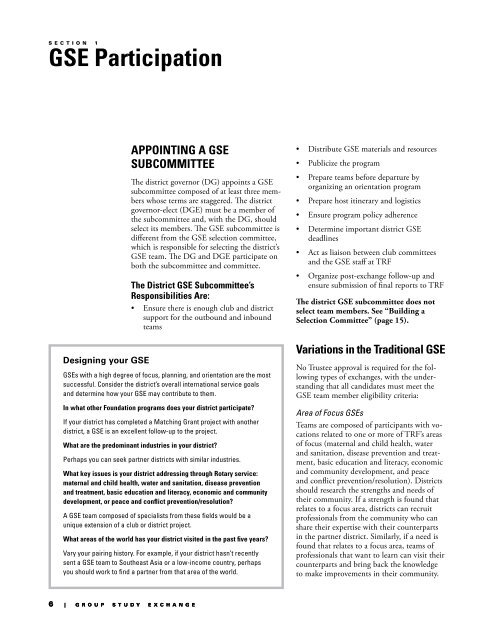
![La présidence du club [222-FR] - Rotary International](https://img.yumpu.com/25855726/1/190x245/la-presidence-du-club-222-fr-rotary-international.jpg?quality=85)

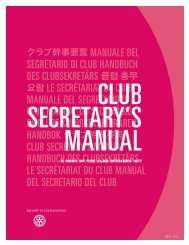
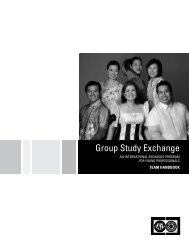
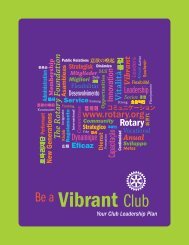
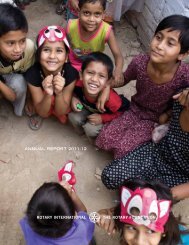

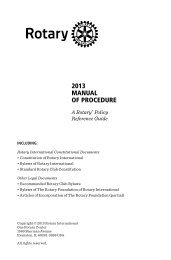

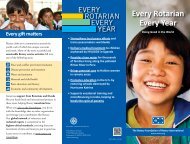
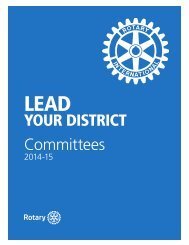
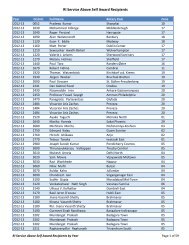
![La conférence de district [800-FR] - Rotary International](https://img.yumpu.com/25855636/1/190x245/la-conference-de-district-800-fr-rotary-international.jpg?quality=85)
